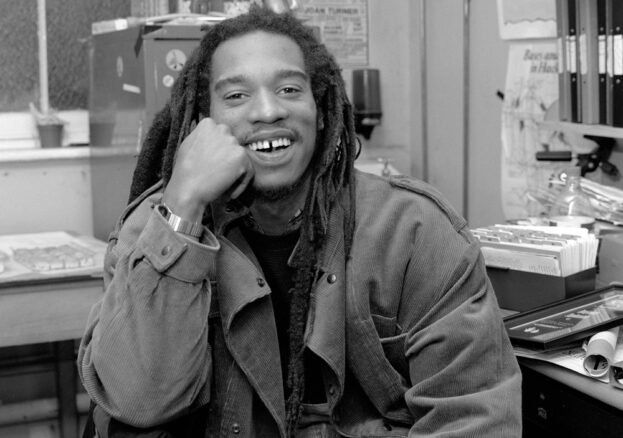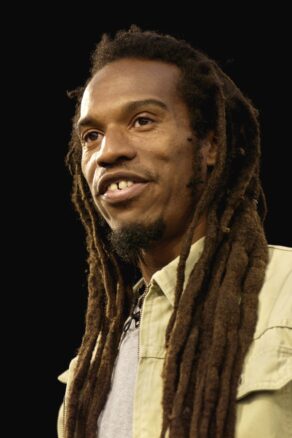
Benjamin Zephaniah’s name resonates with power, passion, and profound poetry. Born on April 15, 1958, in Birmingham, England, Zephaniah emerged as one of the most influential and outspoken voices in contemporary British literature. His life and works are a testament to the enduring power of the written word and the impact of a committed activist’s voice. Zephaniah passed away on December 7, 2023, at the age of 65, after being diagnosed with a brain tumour just eight weeks prior.
Benjamin Obadiah Iqbal Zephaniah was born into a working-class Jamaican family in the Handsworth district of Birmingham. His upbringing in a vibrant, multicultural community profoundly influenced his worldview and literary voice. The experiences of racism, poverty, police brutality, and economic inequality in his youth became central themes in his work, driving his commitment to social justice and community empowerment.
Zephaniah struggled in the conventional education system, finding solace and expression in the rhythms of reggae music and the spoken word. By the age of 15, he had established himself as a popular local performer, using his poetry to address the social issues that plagued his community. Reflecting on his early performances, Zephaniah said, “I was inspired by the reggae artists and poets who spoke about the realities of life. I wanted to do the same for my community.”

In the early 1980s, when punks and Rastas were on the streets protesting about unemployment, homelessness, and the National Front, Benjamin’s poetry could be heard at demonstrations, outside police stations, and on the dance floor. His mission was to take poetry everywhere and to popularise it by reaching people who didn’t read books. His poetry was political, musical, radical, and relevant.
Literary Contributions
Zephaniah’s poetry is characterised by its accessibility, emotional intensity, and rhythmic cadences. He often wrote in a distinct vernacular style, reflecting his Jamaican heritage and his desire to reach a broad audience. His work transcended the boundaries of traditional poetry, blending elements of music, performance, and political activism.
In the 1990s and early 2000s, Zephaniah was particularly prolific. This period saw the release of several major works that cemented his status as a significant literary and cultural figure.
“City Psalms” (1992) is a powerful exploration of urban life, touching on themes of race, identity, and social justice. It marked Zephaniah’s rise as a prominent poetic voice. Another significant collection from this period is “Propa Propaganda” (1996), which continued his exploration of political and social issues, solidifying his reputation as a poet of the people.
Aimed at younger audiences, “Talking Turkeys” (1994) is a collection of children’s poetry that is humorous yet thought-provoking, showcasing Zephaniah’s versatility. “Too Black, Too Strong” (2001) delves into the experiences of black Britons, exploring themes of resilience and resistance.
“We Are Britain!” (2002) celebrates the diversity of British society, featuring poems about children from various cultural backgrounds. “Refugee Boy” (2001), a novel for young adults, tells the story of a young Ethiopian refugee in England, highlighting Zephaniah’s ability to address serious issues in a way that is accessible to younger readers.
During this prolific period, Zephaniah’s work was characterised by its accessibility, rhythmic cadences, and vernacular style, reflecting his Jamaican heritage. He addressed pressing social issues such as racism, police brutality, and economic inequality, making his work resonate with a broad audience. Zephaniah once stated, “My poetry is about the people and for the people. It’s about making change through words.”
Activism and Advocacy
Beyond his literary achievements, Zephaniah was a dedicated activist who had a profound positive impact on his community and the UK. He campaigned tirelessly on issues such as anti-racism, animal rights, and social justice. His activism was deeply intertwined with his poetry, as he used his platform to raise awareness and inspire action.
One of the most significant moments in his activist career was his decision to decline an Order of the British Empire (OBE) in 2003. Zephaniah’s refusal was a powerful statement against the British monarchy and its colonial legacy. In a public letter, he cited his opposition to the empire and its historical oppression of people of colour as his reasons for rejecting the honour. “I get angry when I hear that word ’empire’; it reminds me of slavery, it reminds me of thousands of years of brutality,” he explained.
Zephaniah’s activism extended to his support for organisations such as Amnesty International and his advocacy for the rights of prisoners. His book “We Are Britain!” celebrates the diversity of British society and promotes a message of inclusion and unity. He was a beacon of hope and a champion for the oppressed, using his influence to effect positive change. He famously said, “Racism has no place in the world. And it’s up to us, the people who understand this, to make sure it has no place in our hearts.”
Words that Resonate
Zephaniah’s words have a unique ability to resonate with people from all walks of life. His poetry speaks to universal themes of love, justice, and humanity, while also addressing specific issues of racial inequality and social injustice. His work encourages readers and listeners to question the status quo and to strive for a more equitable world.
One of his most famous poems, “The British”, reimagines the British Isles as a recipe, highlighting the diverse ingredients that make up the nation. This poem is a celebration of multiculturalism and a call for unity, reflecting Zephaniah’s belief in the power of diversity.
Another powerful piece, “Dis Poetry”, challenges traditional notions of poetry and asserts the importance of oral tradition and performance. In this poem, Zephaniah declares, “Dis poetry is not party political, / Not designed for those who are critical.”
Legacy and Impact
Benjamin Zephaniah’s legacy is one of courage, creativity, and commitment. He inspired a generation of poets, activists, and thinkers to use their voices for change. His work continues to be a beacon of hope and a call to action, reminding us of the power of words to transform society.
In a world that often feels divided and unjust, Zephaniah’s poetry offers a vision of a better future. His life and words are a testament to the enduring strength of the human spirit and the possibility of change. As he once wrote, “We can all be heroes, if we are prepared to pay the price.”
Benjamin Zephaniah’s journey from the streets of Birmingham to the global stage is a story of resilience, creativity, and unwavering dedication to justice. His poetry and activism remind us that every voice matters and that through art and action, we can build a more just and compassionate world. His death is a profound loss, but his legacy will continue to inspire and guide future generations.
Remembering Benjamin Zephaniah
As we celebrate Black History Month in 2024, we remember and honour Benjamin Zephaniah’s remarkable contributions. His words and actions have left an indelible mark on the world, and his legacy will continue to inspire us in our ongoing quest for equality, justice, and understanding. Zephaniah’s life is a powerful reminder of the impact that one individual can have in the fight for a better, more inclusive society.
In a heartfelt tribute to the late Benjamin Zephaniah, Birmingham TreePeople are spearheading an inspiring initiative to celebrate the poet’s remarkable life and legacy. The project, known as “The Zephaniah Forest,” aims to plant 65 trees in Burbury Park, Newtown, Birmingham, each representing a year of Zephaniah’s life. This living memorial will not only honour the renowned dub poet and activist but also enrich the community with a lasting symbol of creativity and nature. Central to this tribute is a unique collaboration with poets and artists. Birmingham TreePeople are inviting contributions of 65 poems, one for each tree, to capture themes of memory, nature, and Zephaniah’s profound impact on the world. The forest will be unveiled during National Tree Week at the end of November, featuring community planting days, live poetry readings, and music events.
This project reflects Zephaniah’s enduring influence and his deep connection to the natural world, ensuring that his legacy continues to inspire future generations. For more information about “The Zephaniah Forest” and to support the project, visit the Birmingham TreePeople website at www.birminghamtreepeople.co.uk.
